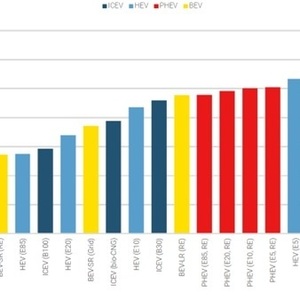Study: Ethanol is a cost-effective way to decarbonize transport

June 13, 2022
BY ePURE
Renewable ethanol fuel blends are the EU’s current most cost-effective solution for decarbonizing the petrol and hybrid cars that will continue to be prevalent on Europe’s roads for a long time, according to new research.
A study from EU climate research consultancy studio Gear Up assessed various renewable fuel and drivetrain options for climate action in the passenger car segment, based on their greenhouse gas emission abatement costs. Among its key findings:
•Currently, renewable ethanol blends, ranging from E10 (with up to 10 percent ethanol) to E85 (with up to 85 percent ethanol), are the most cost-effective solutions to decarbonize the petrol passenger car segment.
•Considering the current GHG intensity of the EU electricity mix and conditions for battery production, battery electric vehicles (BEVs) save less GHG emissions than a regular internal combustion engine car running on E85 fuel on a full-life-cycle basis.
Advertisement
•The savings achieved by the introduction of electric vehicles are insufficient to reach 2030 climate targets, and therefore additional measures are needed for the fleet of internal combustion engine vehicles that remain in the market well beyond 2030.
“The CO2 emission performance standard – stimulating the introduction of electric vehicles – and the proposed RED III target to reduce the emission intensity of fuels, together do not achieve enough greenhouse gas emission reduction to get on track to climate neutrality in 2050,” the report’s authors write. “Higher volumes of renewable fuels are required to reduce emissions in the current (and remaining) fleet of internal combustion engine vehicles.”
The studio Gear Up study looked at the costs and potential GHG savings of switching from a Volkswagen Golf, the most-sold EU mid-size passenger car, running on pure fossil petrol, to low-carbon alternative options in the same car segment. These options included renewable fuels blends (such as E10, E20, E85, but also B30, B100), different levels of electrification (mild hybrid, plug-in hybrid, battery electric vehicle), as well as combinations of hybrid engines with ethanol blends.
It considered the costs of switching from a “societal” perspective, excluding the impact of tax benefits and subsidy schemes that distort the market for EVs. The study also covers the full Well-to-Wheel life-cycle emissions of energy carriers, as well as the impact of manufacturing the vehicles.
Advertisement
Additional findings from a forthcoming study from energy research consultants IFPEN, commissioned by French bioethanol association SNPAA, confirm the effectiveness of ethanol blends in reducing emissions compared to full electric vehicles. IFPEN finds that plug-in hybrids running on low-carbon liquid are at least as effective at reducing emissions as BEVs – not just in 2022 but also for 2030 and 2040.
“Making Fit for 55 fit for purpose requires looking beyond just one solution for decarbonising road transport,” said Simona Vackeová, interim Secretary General of ePURE, the European renewable ethanol association, which commissioned the studio Gear Up study. “While we wait for new technologies to mature and new infrastructure to support them, ethanol is already making a difference. This new research confirms the importance of diversifying solutions. Domestically produced renewable ethanol is an immediate, sustainable, cost-effective and socially inclusive solution to moving beyond fossil fuel.”
Read the full studio Gear Up study here.
Related Stories
The U.S. EPA on July 8 hosted virtual public hearing to gather input on the agency’s recently released proposed rule to set 2026 and 2027 RFS RVOs. Members of the biofuel industry were among those to offer testimony during the event.
The U.S. exported 31,160.5 metric tons of biodiesel and biodiesel blends of B30 and greater in May, according to data released by the USDA Foreign Agricultural Service on July 3. Biodiesel imports were 2,226.2 metric tons for the month.
The USDA’s Risk Management Agency is implementing multiple changes to the Camelina pilot insurance program for the 2026 and succeeding crop years. The changes will expand coverage options and provide greater flexibility for producers.
EcoCeres Inc. has signed a multi-year agreement to supply British Airways with sustainable aviation fuel (SAF). The fuel will be produced from 100% waste-based biomass feedstock, such as used cooking oil (UCO).
President Trump on July 4 signed the “One Big Beautiful Bill Act.” The legislation extends and updates the 45Z credit and revives a tax credit benefiting small biodiesel producers but repeals several other bioenergy-related tax incentives.
Upcoming Events










